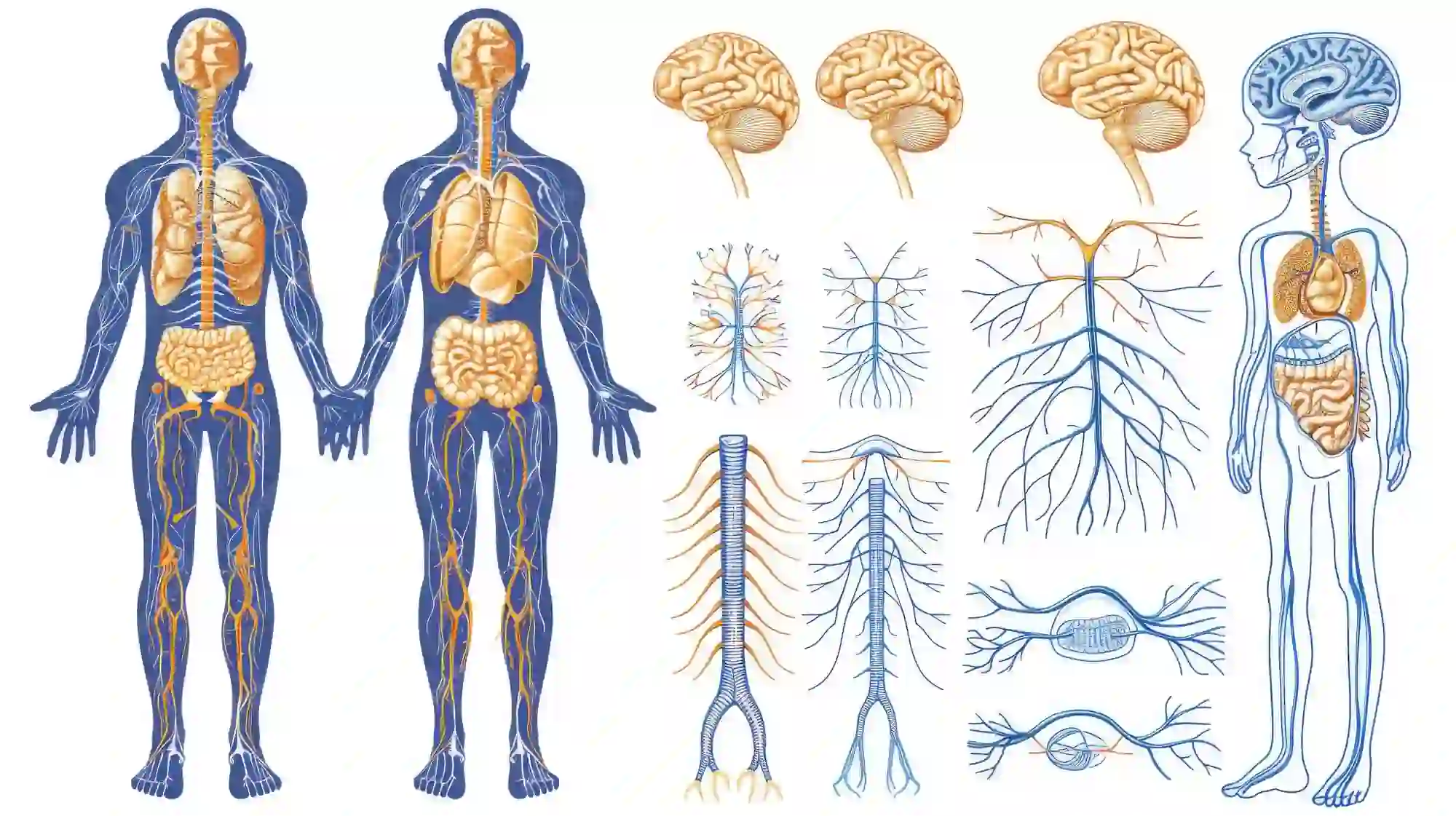The nervous system is the body’s ultimate communication network — a vast web of nerves, signals, and reactions that control everything from your heartbeat to your thoughts. It’s what lets you move, feel, remember, and respond to the world around you. In short, it’s the power grid that keeps life running smoothly.
From every heartbeat to every emotion — your nervous system is quietly running the show, shaping your moods, decisions, and even how you recover after stress.
In this guide, you’ll discover interesting facts about the nervous system that reveal just how incredible your inner wiring really is. So, take a deep breath, settle in, and let’s explore these interesting facts about the nervous system that will leave you appreciating your body in a whole new way.
The Real Mind-Body Connection: Interesting Facts About the Nervous System
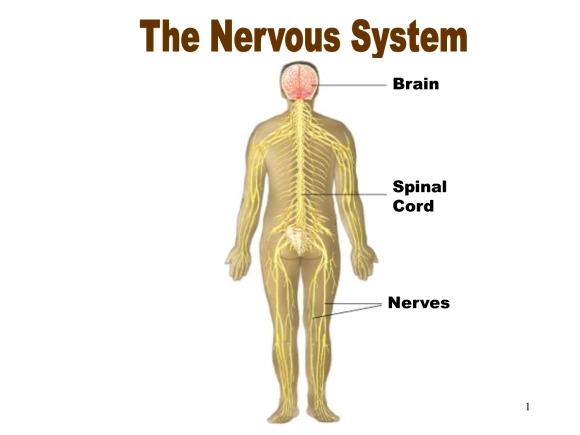
From every heartbeat to every emotion — your nervous system is quietly running the show. You don’t see it, and most days, you probably don’t think about it. But it’s there, humming in the background, keeping everything connected — your thoughts, your movements, your breath, even the small tremor in your hand when you’re anxious.
When people talk about the “mind-body connection,” this is it. Your nervous system is that link. It’s the network that decides how fast your legs move on a run, how quickly you react when a glass slips from your hand, and even how you process joy, pain, or motivation. Kind of wild when you stop to think about it.
At its core, the system has two main players — the brain and spinal cord (that’s the central nervous system), and the vast web of nerves that branch out everywhere else (the peripheral system). Together, they form your body’s personal communication grid — faster than any internet connection, more reliable than any device you own.
If you’re into fitness or mindfulness, understanding this system changes how you view your own performance. It’s not just about muscles or willpower. Every squat, every meditation breath, every craving or emotional wave — all of it traces back to your nervous system function.
And maybe that’s why it’s so fascinating. Beneath your awareness, it’s constantly balancing chaos and calm, speed and stillness. Kind of poetic, really.
So, let’s take a look — 15 incredible, science-backed interesting facts about the nervous system that’ll make you see your body’s inner wiring in a whole new way. Some of these might surprise you, others might make you appreciate the silent intelligence that’s been working for you all along.
And if you’re into deep dives, you might want to check out “How the Brain Reacts to Stress” or “Mind-Body Connection Explained” later — they tie into a lot of what we’ll talk about here.
The Nervous System: Your Body’s Ultimate Command Center
Okay, imagine this: you touch a hot stove. Before you even realize what happened, your hand’s already pulled away. That’s your nervous system doing its job faster than you can think — literally.
The nervous system is like your body’s control room. It’s divided into two main parts — the central nervous system (CNS) and the peripheral nervous system (PNS).
- The CNS is your headquarters — the brain and spinal cord — where decisions get made.
- The PNS is the messenger network — all the nerves that reach out from your spine to every part of you, carrying information back and forth.
Every movement, every breath, every blink — they’re all just signals. Tiny electrical messages zipping through neurons at speeds you can’t even imagine.
How It Controls Every Movement, Breath, and Thought
Here’s the part that still blows my mind a little: those signals travel through neurons — specialized cells that don’t just pass messages, they process them. Each neuron connects to thousands of others, creating circuits that decide everything from reflexes to emotions.
So when you’re running, the brain’s motor cortex fires up, sending a flurry of instructions down your spinal cord, through motor neurons, all the way to your muscles. The result? Motion. Effortless, synchronized motion that looks simple but is actually billions of electrical events per second.
Neurotransmitters (the brain’s chemical messengers) help regulate mood, memory, and focus. That “runner’s high”? It’s partly serotonin and dopamine released through this very network.
And it’s not just about movement. Your nervous system’s always multitasking — monitoring your heartbeat, managing digestion, controlling breathing. Even when you’re asleep, it’s quietly making sure your organs and systems don’t skip a beat.
Maybe that’s why people call it the “command center.” It’s the reason you feel, think, and act — all at once. Without it, every other system in your body would just… sit there, waiting for orders that never come.
I. Fact #1: Your Brain Has More Connections Than the Milky Way Has Stars
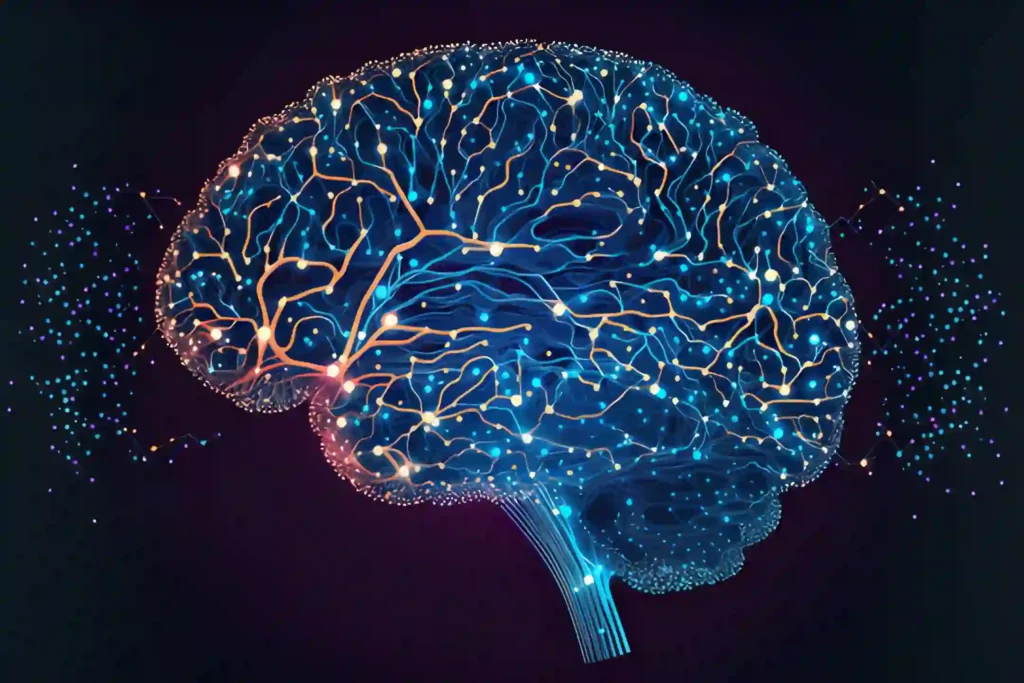
Here’s one of those mind-bending truths — your brain holds more connections than the Milky Way has stars. Seriously. Over 100 billion neurons form trillions of connections, constantly firing, reshaping, remembering, and forgetting.
If you’ve ever wondered why the nervous system is important, this is a big part of the answer. Every memory, every emotion, every time you recall the lyrics to a song you haven’t heard in years — that’s this massive web doing its thing.
And the wild part? It’s not static. Your brain changes with every thought and experience. Scientists call this neuroplasticity, and it’s the reason you can learn new skills at any age, heal after injury, or reframe negative habits.
You might not notice it happening, but when you take up meditation, or learn guitar, or even adjust your posture, your nervous system function literally rewires itself. The “you” from last month doesn’t have the exact same neural connections as the “you” reading this now.
Quick Perspective Table:
| Neural Fact | What It Means for You |
| 100 billion neurons | A nearly limitless capacity for learning and adaptation |
| Trillions of synapses | Complex thought, creativity, and emotional intelligence |
| Constant rewiring | The brain evolves with experience — every single day |
And that’s the thing — the more you use it, the stronger it gets. Like a muscle, but quieter.
II. Fact #2: Your Nerves Communicate Faster Than a Sports Car
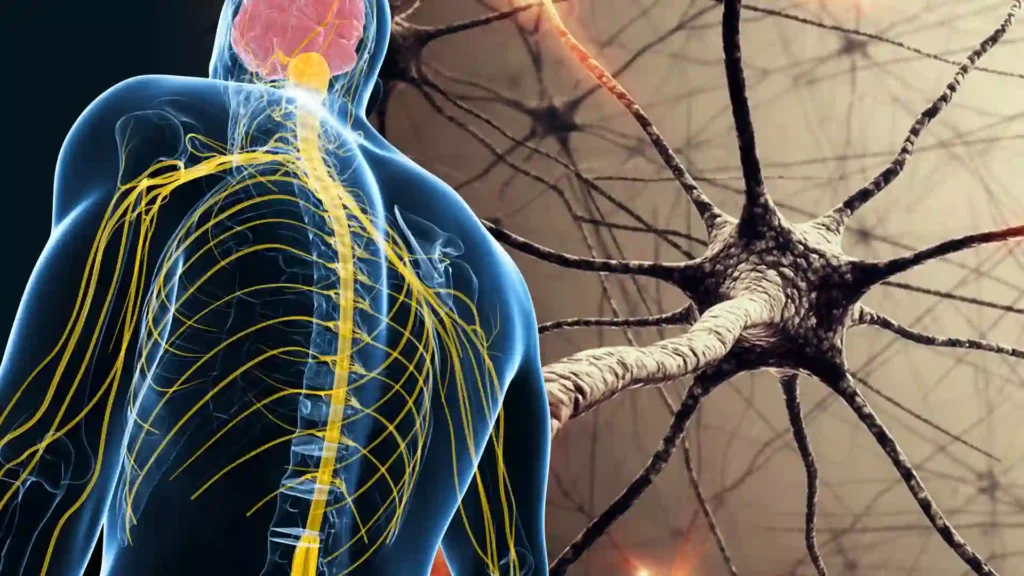
You might think your phone or Wi-Fi is fast — but your body’s internal wiring would blow both out of the water. Some nerve signals race through your system at up to 268 miles per hour (431 km/h). That’s faster than a Formula 1 car at top speed.
It’s one of those fun and interesting facts about the nervous system that makes you stop for a second — because it means your reflexes, reactions, and every split-second decision are literally powered by electrical surges inside you.
When you touch something hot or trip mid-walk, your sensory neurons send urgent alerts to your spinal cord before your brain even gets involved. That’s why you pull your hand away instantly. It’s survival speed.
And if you’ve ever trained for a sport, this comes into play more than you realize. Quick reflexes aren’t just “good reactions.” They’re the result of efficient neural pathways between your brain, spinal cord, and muscles. With practice — say through agility drills, dance, or martial arts — those neural connections get faster, cleaner, more automatic.
A few quick examples of how nerve speed impacts real life:
- In workouts, It sharpens coordination and power output.
- In driving, It improves reaction time and focus.
- In emotions: It explains why stress or fear can trigger instant body reactions (heart racing, pupils widening).
So, when people ask “what are some interesting facts about the nervous system?” — this one always makes the list. It’s science that you can feel.
Pro Tip 💡
Your nerves are fueled by electrolytes — sodium, potassium, and magnesium. Staying hydrated (especially post-workout) helps those electrical signals travel more efficiently. If your energy or focus feels off, it’s not always “motivation.” Sometimes, your wiring just needs better fuel.
III. Fact #3: Your Gut Has Its Own Mini Nervous System
This one always feels a bit unbelievable at first — but your gut has its own nervous system. Scientists call it the enteric nervous system (ENS), and it contains over 500 million neurons — roughly the same number as in a cat’s brain. So yeah, your gut’s kind of thinking for itself down there.
That’s why it’s often called the “second brain.” It operates semi-independently, quietly managing digestion, nutrient absorption, and even mood. That flutter in your stomach before a big event? Not just nerves — it is nerves.
And here’s where it gets really interesting: about 90% of serotonin, your feel-good neurotransmitter, is actually produced in your gut. So, if your digestion’s off or you’re eating in a way that stresses the gut lining, your mood can follow.
People often ask why the nervous system is important, but few realize that this gut–brain axis might be one of its most important branches.
A quick look at how the gut “talks” to the brain:
| Pathway | Function |
| Vagus Nerve | Carries emotional and sensory info between the gut and brain |
| Enteric Neurons | Regulate muscle contractions and the speed |
| Gut Microbiome | Influences neurotransmitter production and inflammation |
When this connection is disrupted — through chronic stress, poor sleep, or an unbalanced diet — it can lead to digestive issues and mood swings.
It’s why nutritionists and mental health experts now talk about food and mood in the same sentence. Eating fiber, fermented foods, and best prebiotics can support not just digestion, but also nervous system function overall.
Pro Tip 🥦
If you want a calmer mind, start with your stomach. Think less “brain food” and more “gut food.” Foods like yogurt, kimchi, kefir, and even bananas help the enteric system thrive. It’s one of those 10 unknown facts about the nervous system that changes how you see your meals forever.
IV. Fact #4: Your Brain Uses 20% of Your Body’s Energy
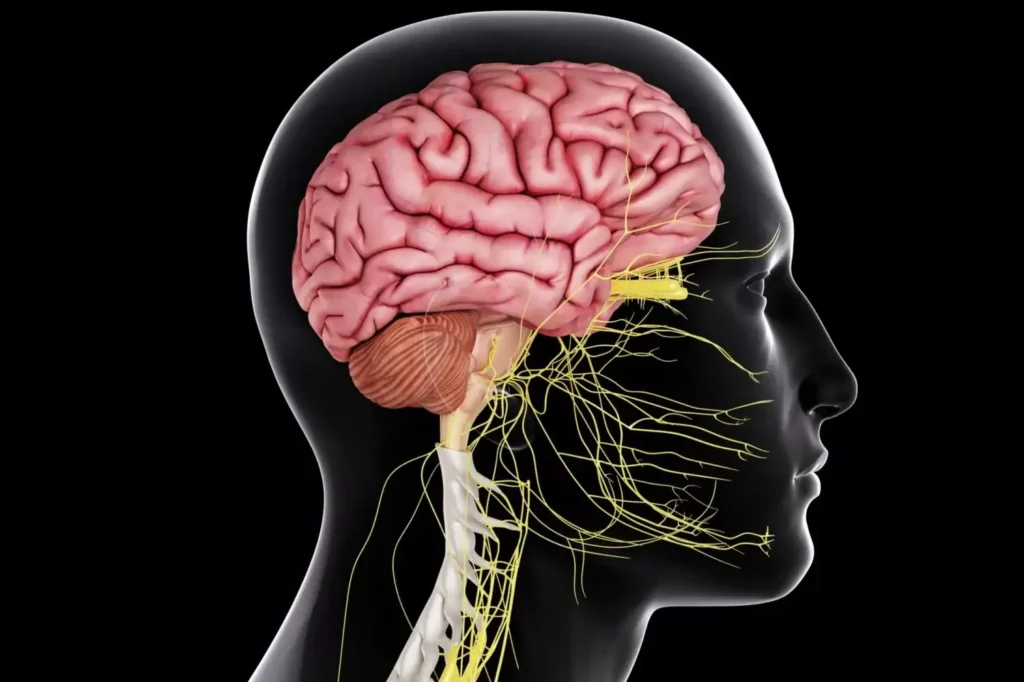
Here’s something you probably didn’t expect from a list of fun and interesting facts about the nervous system: your brain — which weighs only about three pounds — consumes around 20% of your body’s total energy. That’s right. One-fifth of everything you eat, drink, and breathe goes straight to powering thought, memory, and decision-making.
So when you feel mentally drained after a long day of focus, it’s not “all in your head.” It’s actually in your head — your brain has burned through serious fuel.
If you ever wonder why the nervous system is important to nutrition or fitness, this is exactly why. Your neurons are constantly firing, even while you’re asleep, and they depend heavily on glucose (from healthy carbs), fatty acids (from omega-3s), and plenty of oxygen.
That’s also why people who skip meals or don’t hydrate often feel foggy or irritable — their brain’s energy supply flickers.
Here’s how your energy balance directly affects nervous system function:
- Low hydration → slower signal transmission
- Poor sleep → disrupted neural repair and memory processing
- Lack of healthy fats → weaker nerve insulation (myelin sheaths)
- Too much caffeine → overstimulation of stress responses
To keep your brain’s internal engine running smoothly, aim for balanced meals — complex carbs, proteins, and good fats — and regular rest. Think of it less like dieting and more like charging a high-performance system.
Mini-list: Simple ways to feed your brain better
- Add omega-3-rich foods like salmon, flaxseeds, or walnuts.
- Drink enough water (dehydration literally slows neural communication).
- Prioritize sleep over scrolling — that’s when neurons detoxify.
- Limit refined sugar — energy spikes often lead to mental crashes.
Pro Tip 💤
Your brain’s energy use doesn’t stop when you sleep — that’s when it does its housekeeping. The glymphatic system (your brain’s waste-clearing crew) becomes active at night. If you’re skipping deep sleep, you’re basically skipping cleanup.
V. Fact #5: You’re Literally Electrically Charged
Here’s one that feels almost sci-fi: your entire body runs on electricity. Not the shocking kind you get from static, but the gentle, precise electrical impulses that make neurons talk to each other.
Every thought, every blink, every heartbeat — all powered by microcurrents flowing through nerve cells. It’s one of those most interesting facts about the nervous system that sounds poetic and scientific at the same time.
Neurons communicate using ions — charged particles of sodium, potassium, and calcium. When these ions move across the neuron’s membrane, they create tiny voltage changes called action potentials. Those signals jump from cell to cell, forming everything from a reflex to a dream.
When your electrolytes are out of balance — say you’ve been sweating during a workout or skipping hydration — your nervous system function slows down. Signals misfire, muscles cramp, focus drops. Suddenly, you’re not just tired, you’re short-circuited.
A quick list of “electric” essentials your nerves depend on:
- Sodium – helps generate electrical signals.
- Potassium – balances charge and supports muscle contractions.
- Magnesium – calms overactive neurons and supports recovery.
- Calcium – triggers neurotransmitter release at synapses.
So yeah, staying hydrated isn’t just about quenching thirst — it’s about keeping your body’s wiring online.
Pro Tip ⚡
After intense workouts or sauna sessions, skip the sugary “energy” drinks and opt for coconut water, bananas, or a pinch of Himalayan salt in water. They naturally restore electrolyte balance. That little trick supports both muscle recovery and brain function.
VI. Facts #6–8: Hidden Wonders of the Brain and Nerves
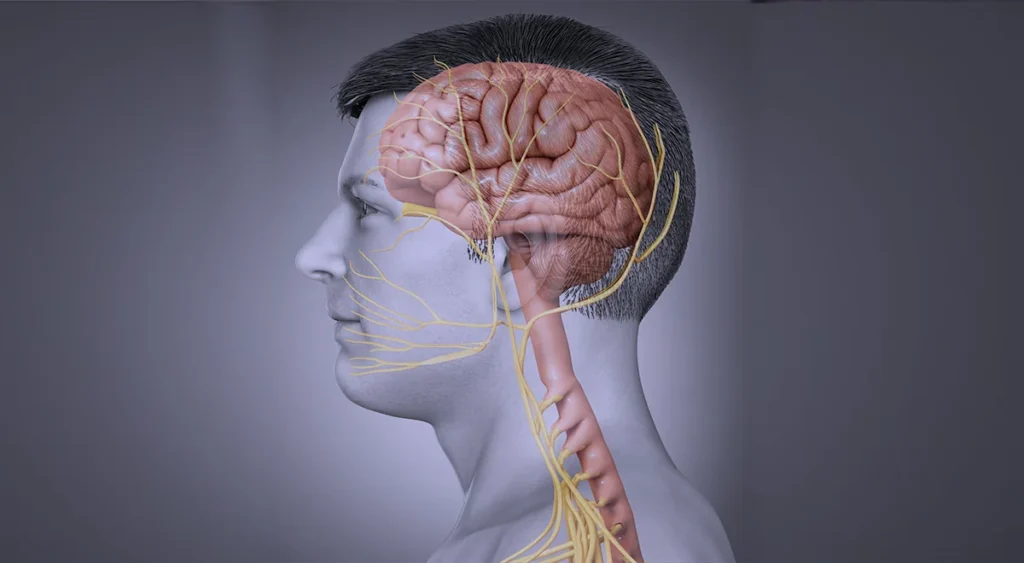
The human brain isn’t fixed. It’s flexible — almost like clay that reshapes with every thought and experience. That’s neuroplasticity, and it’s the reason you can learn, adapt, and even heal.
When you practice something — whether it’s piano, meditation, or positive thinking — your neurons strengthen their connections. That’s your brain literally rewiring itself for new skills or calmer reactions.
It’s kind of comforting, honestly. You’re never stuck. You’re just rewiring slowly.
7. Your Nerves Remember Pain
Strange but true — even after an injury heals, your nerves can “remember” the pain. It’s not imaginary; it’s neurological memory. Sometimes, the brain continues to send pain signals even when the body’s tissue has fully recovered.
This is why chronic pain feels so mysterious. It’s not that your body’s broken — it’s that your nervous system function has learned a pain loop. Techniques like mindfulness, breathing, and retraining exercises can help re-educate those signals.
A fun way to look at it: your nerves are a bit like emotional sponges — they hold on longer than they should.
8. The Brain Has No Pain Receptors
Now, here’s a twist — even though your brain processes pain, it can’t feel it. There are no pain receptors in brain tissue itself. That’s how surgeons can perform brain surgeries on awake patients — the brain doesn’t actually sense pain, only interprets it from other parts of the body.
This one always pops up on lists like “25 facts about the nervous system” and “interesting fun facts about the nervous system for kids.” It’s strange but cool: your brain, the organ that screams when you stub your toe, is itself completely numb.
Quick Recap of These Hidden Wonders
| Fact | What It Teaches You |
| Neuroplasticity | You can reshape habits and reactions through practice |
| Pain Memory | Chronic pain is often a “learned” signal |
| No Pain Receptors | The brain interprets pain, but doesn’t feel it directly |
Pro Tip 🧘♀️
If you’re dealing with stress or chronic tension, try meditation or journaling. They activate neuroplasticity and help calm overactive pain circuits. Small daily mindfulness habits can literally retrain your nervous system to chill out.
VII. Facts #9–11: How Stress and Emotions Impact Your Nerves
Ever notice how your heart races before a big presentation? Or how your stomach knots up when something feels off? That’s your sympathetic nervous system kicking in — the famous fight-or-flight response.
It’s not a bad thing. It’s ancient. It’s survival. Your nervous system senses danger (real or imagined) and sends out a cascade of signals — adrenaline, faster heart rate, dilated pupils — to prepare you for action.
It’s one of those fun and interesting facts about the nervous system that you can actually feel. The same system that helps you sprint from danger also helps you perform better under pressure — it sharpens focus, increases oxygen flow, and heightens alertness.
But here’s the tricky part: your brain doesn’t always know the difference between an actual threat and an email notification at midnight.
Pro Tip 🧠
If your fight-or-flight system feels constantly “on,” try slow breathing — five seconds in, five seconds out. It signals the parasympathetic nervous system (the rest-and-digest branch) to take back control. Within minutes, your body chemistry shifts.
10. Chronic Stress Can Damage Nerve Health
This one’s less fun but super important. Prolonged stress can literally wear down your nervous system function. Too much cortisol (the stress hormone) over time can shrink neural connections in areas like the hippocampus — the part responsible for memory and learning.
That’s why people under chronic stress often struggle with brain fog or forgetfulness. The system’s just overloaded.
Even small daily stressors — traffic, deadlines, too much caffeine — can chip away if your recovery time is short. So yeah, why is the nervous system important? Because it’s your emotional anchor. If your nerves are frazzled, everything else starts to unravel, too.
How Chronic Stress Affects Your Nerves
| Symptom | Underlying Nervous System Effect |
| Constant fatigue | Adrenal overdrive, reduced parasympathetic recovery |
| Brain fog | Lowered neurotransmitter activity |
| Poor sleep | Disrupted circadian rhythm and melatonin release |
| Mood swings | Imbalanced serotonin and dopamine signaling |
Pro Tip 🌿
Create “mini-reset moments” during the day — step outside, stretch, and close your eyes for 30 seconds. It’s not wasted time; it’s nervous system maintenance.
11. Meditation Calms the Sympathetic Nervous System
It sounds simple, but meditation genuinely rewires your nerves. Studies show consistent mindfulness practice reduces sympathetic overactivity and strengthens the parasympathetic system — the one that promotes rest, digestion, and healing.
Even 10 minutes a day of quiet focus can lower your heart rate, improve digestion, and reset your mood. And that’s not just spiritual fluff — it’s pure nervous system science.
If you’ve ever read “10 interesting facts about the nervous system for kids,” this one’s often simplified as “relaxing helps your brain.” But it’s deeper than that — relaxing is training. You’re literally conditioning your body’s most vital network to respond differently to stress.
Simple Meditation Variations
- Box breathing: Inhale 4s, hold 4s, exhale 4s, hold 4s.
- Walking meditation: Notice your steps, your breath, the wind.
- Mindful pause: Between tasks, take 10 seconds to reset awareness.
VIII. Facts #12–14: Movement, Sleep, and Recovery
Here’s a fun paradox: you’d think exercise only trains your muscles, but really, it trains your nerves first. Every movement — from lifting weights to dancing in your kitchen — starts as a signal from your brain.
Over time, your nervous system function improves efficiency, sending faster and clearer signals to your muscles. That’s why you get stronger before you even build visible muscle — your brain’s becoming a better coach.
Regular movement also boosts neurotransmitters like serotonin and endorphins. It’s one of those 5 interesting facts about the nervous system that link physical and emotional fitness together.
Pro Tip 💪
Alternate between intense activity and calm recovery days. The nervous system loves variety — too much intensity with no downtime keeps it on edge. Balance creates resilience.
13. Deep Sleep Repairs Neural Pathways
You know how your mind feels foggy after a sleepless night? That’s because your brain didn’t get to run its nightly cleanup cycle — the glymphatic system, which clears toxins and waste from neurons.
During deep sleep, cerebrospinal fluid flushes through the brain like a nighttime rinse, repairing and resetting your nervous system function. That’s why you think clearer, move better, and feel calmer after real rest.
Sleep Stages and Nervous System Roles
| Sleep Stage | Nervous System Activity |
| Light Sleep | Transition to recovery, heart rate lowers |
| Deep Sleep | Neural repair, glymphatic detox |
| REM Sleep | Memory consolidation, emotional regulation |
So when people ask why the nervous system is important, the answer can be as simple as: because it only heals when you rest.
Pro Tip 😴
Try winding down with dim lighting an hour before bed. Blue light suppresses melatonin and confuses your brain’s clock. It’s like trying to fall asleep while someone’s flashing a flashlight at your neurons.
14. Your Reflexes Can Improve with Practice
Remember the first time you tried catching a ball and missed? That was your nervous system learning timing. Reflexes — those automatic responses — get sharper through repetition.
Athletes and dancers rely on this “reflex training” constantly. It’s not just muscle memory; it’s neural efficiency. Over time, your reflex arcs shorten, meaning the signal travels faster and your response becomes smoother.
Even simple activities like yoga or reaction games help fine-tune your nervous system function. It’s a perfect example from any list of 20 fun facts about the nervous system — that you can train your brain and nerves as easily as muscles.
Pro Tip ⚙️
If you want to feel more coordinated or focused, mix brain–body activities — juggling, tai chi, even drumming. They build new neural bridges and keep your reflexes lively.
XI. Fact #15: Your Nervous System Never Truly Rests
Here’s something almost poetic — your nervous system never actually sleeps. Even when you drift off, your brain remains partially active, monitoring breathing, heart rhythm, and body temperature. It’s like a silent guardian, always on duty.
That’s one of the most fascinating facts about the human nervous system — it operates 24/7, quietly running every heartbeat, every breath, every dream.
Even when you’re resting, billions of neurons fire tiny signals to keep your organs synced. Your subconscious thoughts, your night dreams, that sudden twitch in your sleep — they all come from this constant hum of neural activity.
So when people say, “I just need to rest my nerves,” it’s not just a phrase — it’s a biological truth. The body craves stillness, but the network inside you keeps the lights on.
5 Times Your Nervous System Works While You Sleep
- Adjusting your body temperature throughout the night.
- Maintaining steady breathing and heart rhythm.
- Consolidating new memories and skills.
- Managing hormone release for repair and growth.
- Resetting emotional balance through REM cycles.
Pro Tip 🌙
Create a “digital sunset” at least 30 minutes before bed. Screens overstimulate your visual cortex and trick your nervous system into thinking it’s still daylight.
Conclusion
Maybe the truth about your body’s command center isn’t as simple as science books make it sound. The nervous system isn’t just wires and signals — it’s emotion, intuition, reflex, memory, and healing. It’s you.
Every heartbeat, every blink, every thought you’ve ever had passes through this intricate network of neurons. And the more you understand it, the better you can care for it — through movement, stillness, nutrition, and calm.
So if you came here looking for interesting facts about the nervous system, maybe the most interesting one is this: your body already knows what balance feels like — it just needs you to listen.
Take care of your nervous system, and it’ll take care of you for life. Because the real magic isn’t just in the science — it’s in awareness. When you tune in, you realize how intelligent your body truly is.
Keep exploring, keep learning, and you’ll find that the most powerful, interesting facts about the nervous system are the ones you can actually feel.
Frequently Asked Questions
1. What are 10 facts about the brain?
The human brain weighs about 3 pounds and uses 20% of the body’s energy. It can generate enough electricity to power a small light bulb. It’s also more active at night than during the day, especially while you dream.
2. What are 5 things you could not do without your nervous system?
You couldn’t move, think, feel, breathe, or sense the world around you without your nervous system. It’s essential for everybody’s function. Without it, your body would lose all coordination and control over even the simplest actions.
3. Has a nervous system but no brain?
Jellyfish, starfish, and sea urchins have a nervous system but no brain — they rely on nerve nets to respond to stimuli. Their bodies still coordinate movement and reactions through simple nerve signals instead of conscious thought.
4. What is so special about the nervous system?
It connects every part of your body, allowing you to think, move, and feel instantly — like your body’s superfast communication network. It also adapts and learns constantly, reshaping itself through experience — a process known as neuroplasticity.
5. What are 10 interesting facts about the nervous system?
Your brain sends signals at 250 mph, has over 86 billion neurons, and keeps working even while you sleep — just to keep you alive and thinking. It’s the only system that can heal, rewire, and grow stronger based on how you use it every single day.
6. What is brain 🧠?
The brain is your body’s control center, managing thoughts, emotions, memory, and actions through billions of nerve connections. It’s protected by the skull and nourished by constant blood flow, ensuring it never stops working — even when you rest.
7. Can a human live without a nervous system?
No, humans cannot live without a nervous system — it’s vital for breathing, heartbeat, and every conscious or unconscious function. Without it, the body would lose all coordination, awareness, and the ability to sustain life.
8. What is the most common nervous system disease?
Alzheimer’s disease is the most common, followed by Parkinson’s and multiple sclerosis, all affecting brain and nerve function. These disorders often progress slowly, impacting memory, movement, and overall quality of life.
9. What is the best thing for the nervous system?
Healthy sleep, a balanced diet, regular exercise, and stress management are key to keeping your nervous system strong and active. Practicing mindfulness and staying mentally engaged also help strengthen neural connections over time.
10. Which creature has 32 brains?
The leech has 32 brains — one in each of its 32 body segments, coordinating its movements and responses. This unique setup allows it to move fluidly and respond quickly to its environment.

